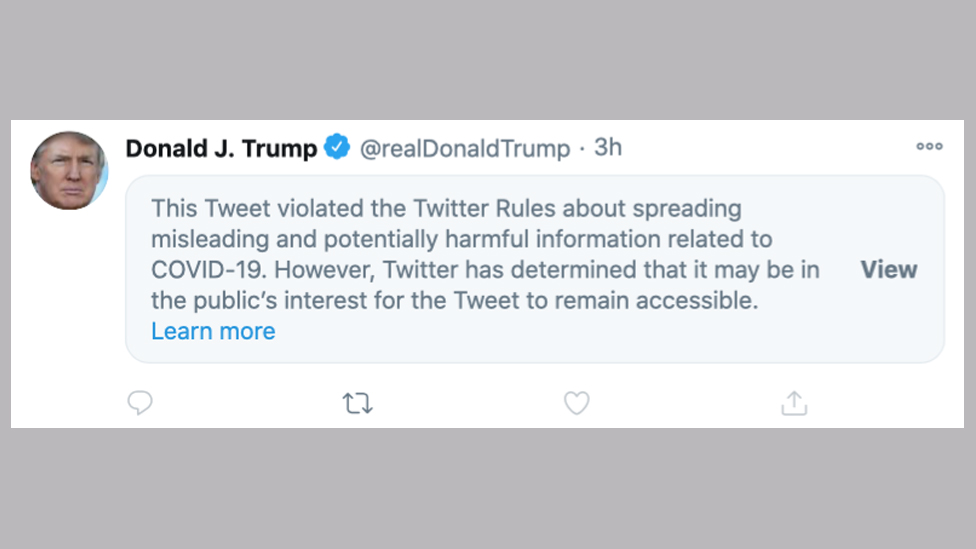
This article is more than
5 year old
Mr Trump is at the White House after three days of hospital treatment having tested positive for the virus.
He wrote the US had "learned to live with" flu season, "just like we are learning to live with Covid, in most populations far less lethal!!!"
Twitter hid the same message behind a warning about "spreading misleading and potentially harmful information".
Users have to click past the alert to read the tweet.
"We remove incorrect information about the severity of Covid-19, and have now removed this post," said Andy Stone, policy communications manager at Facebook.
An exact mortality rate for Covid-19 is not known, but it is thought to be substantially higher - possible 10 times or more - than most flu strains, according to Johns Hopkins University.
The President has reacted by posting: "REPEAL SECTION 230!!!"
This is a reference to a law that says social networks are not responsible for the content posted by their users.
But it allows the firms to engage in "good-Samaritan blocking", including the removal of content they judge to be offensive, harassment or violent.
If the law were to be repealed, social media companies would face being sued over the edits and changes of user content they made.
This is the second time that Facebook has deleted a post from the president. Twitter has intervened more often with deletions and warnings.

Both social networks have vowed to combat potentially dangerous misinformation around the virus.
But Mr Trump has taken issue with what he sees as editorialising by the companies.
Shortly after Twitter put a warning label on his posts for the first time in May, Mr Trump signed an executive order to repeal Section 230.
The proposal has attracted cross-party support - but for different reasons.
The Republicans say there is a bias against or even outright censorship of conservative views online and want this to stop. The Democrats say they are more interested in the spread of misinformation.
Last week, the US Senate Commerce Committee issued subpoenas for the heads of Facebook, Twitter and Google to probe the matter further.
Pressure has been mounting on Facebook and Twitter to do more to tackle misinformation both about the pandemic and the US election. For that reason, their decisive action on Trump's recent post promoting false claims about the severity of coronavirus will be welcomed.
That said, Trump's comments about the flu - and those yesterday saying "Don't be afraid of Covid" - have already started to fuel conspiracy theories online.
Posts in pro-Trump and anti-mask Facebook groups have shared the comments with captions about the pandemic not being real, or not very serious. They have also used it to encourage others not to follow health guidance like wearing a mask or social distancing.
Early on in the pandemic, the BBC investigated the human cost of misinformation, including those who fell seriously ill because social media posts led them to doubt the reality or severity of the pandemic and ignore advice.
The hope will be that this action from social media sites could reduce the risk of that happening - but those who may have already been exposed to this disinformation could be impacted.
And all eyes will be on social media sites to see if they keep up this approach to tackling disinformation - coronavirus, political or otherwise - especially from the US Election candidates as polling day nears.